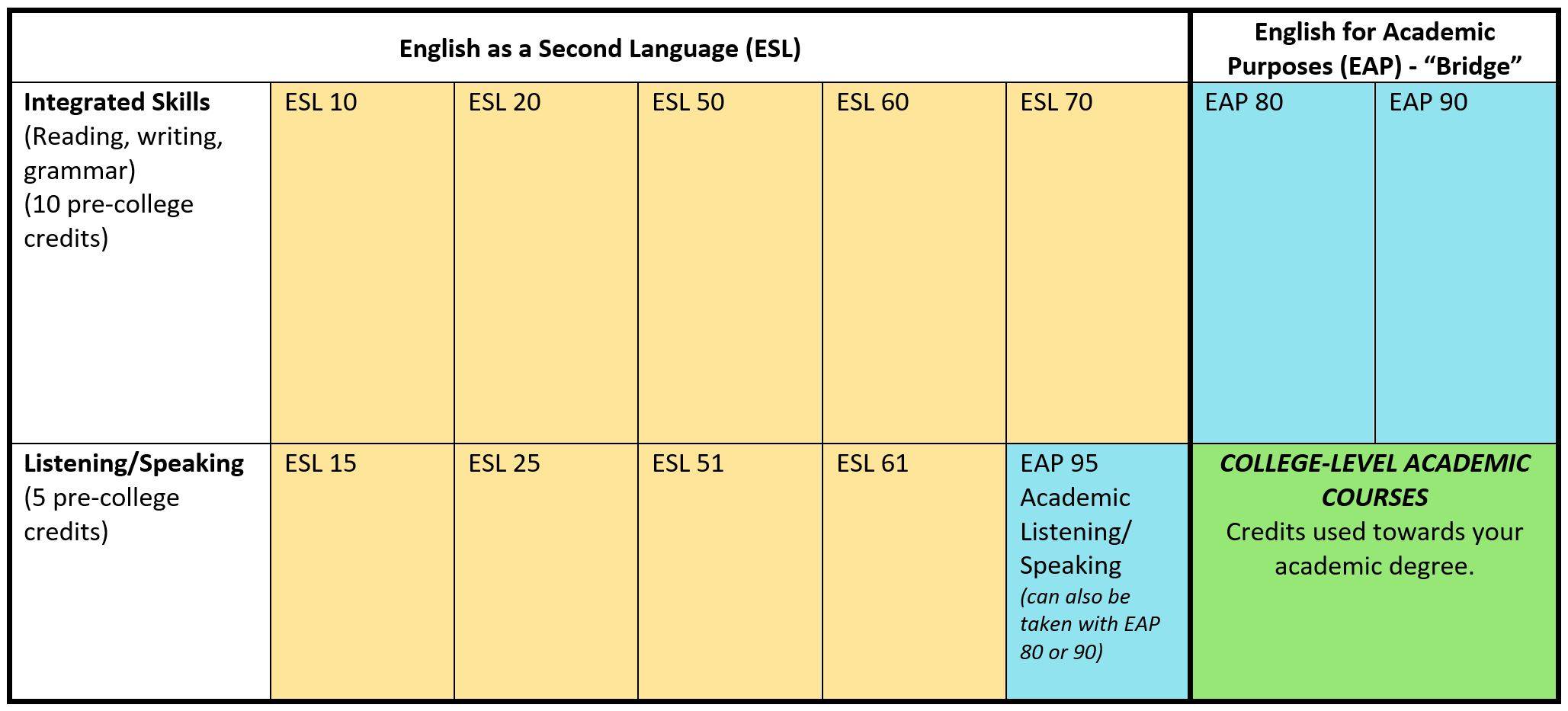English Language Programs
Shoreline offers basic to advanced level English classes. ESL classes are for students who are developing their basic to intermediate English language skills. English for Academic Purposes (EAP) begins with EAP 80. Students in EAP usually take a combination of high-level English language and writing classes and college-level classes that do not have an English prerequisite. After students complete these classes, they will move into a full college-level academic program, including English 101.
Shoreline does not require an English proficiency test for admission. However, if you have taken an English proficiency test, see if your scores can place you into EAP or English 101. Students who have not taken a proficiency test or whose scores did not qualify will take Shoreline's English placement test during orientation.

ESL & EAP Learning Outcomes
ESLAF 050 (Integrated Skills - Level 3)
10 credits
- Write single paragraphs with a topic sentence and basic support on familiar topics, using level-appropriate grammar in simple and compound sentences.
- Use newly-acquired vocabulary in written work.
- Make basic edits to writing based on teacher feedback.
- Demonstrate comprehension of level-appropriate texts.
- Interpret simple charts, graphs, tables, and schedules.
- Identify and use key information from authentic materials such as bills, receipts, bank statements, advertisements, rental agreements, medical prescriptions, and maps and schedules.
ESLAF 051 (Speaking and Listening – Level 3)
5 credits
- State information about self, interests, opinions, and goals using level-appropriate grammar and vocabulary.
- Ask questions using level-appropriate grammar and vocabulary.
- Request, confirm and clarify basic information.
- Respond appropriately to oral communication in the classroom and community.
- Respond to questions using a variety of tenses.
- Follow multi-step oral directions.
- Identify key information in spoken communication, such as date, time, price, and location.
ESLAF 060 (Integrated Skills - Level 4)
10 credits
- Write one paragraph on a single topic incorporating main ideas and clear supporting details.
- Use grammar and sentence structures appropriate to level.
- Make basic edits to grammar and spelling based on teacher feedback.
- Expand and use common vocabulary in written work.
- Apply level-appropriate reading strategies to comprehend low-intermediate texts.
- Use appropriate strategies (context, guessing, dictionary) to understand unfamiliar vocabulary.
- Locate important information through skimming / scanning in a variety of texts including realia.
ESLAF 061 (Speaking and Listening – Level 4)
5 credits
- Listen to information and identify key points on a familiar subject.
- Respond to requests for assistance or information.
- Follow multi-step directions.
- Identify and record main ideas and details in pre-college lectures
- Use formal and informal language in appropriate settings.
- Request, confirm, and clarify basic information in a variety of situations.
- State personal opinions and provide reasons.
- Present information to small or large groups.
- Communicate effectively in groups and pairs.
ESLAF 070 (Integrated Skills Level 5)
10 credits
- Write single and connected paragraphs incorporating topic sentence and detailed support, using vocabulary that is audience-appropriate.
- Use a variety of sentence types including simple, compound, and complex.
- Use revision strategies and feedback to edit for grammatical accuracy and general clarity.
- Identify main ideas and supporting details of level-appropriate paragraphs and articles.
- Apply appropriate reading strategies (e.g. pre-reading, restating, predicting) to help comprehend level-appropriate academic reading passages.
- Expand understanding and use of common and academic vocabulary.
EAP 095 (Academic Listening and Speaking)
5 credits
- Speak clearly so that others can understand.
- Use appropriate, introductory college-level vocabulary.
- Ask questions for clarification.
- Present information with reasonable accuracy and fluency using only brief notes.
- Take notes while listening to spoken English.
- Identify main ideas and key details of introductory college-level lectures.
- Identify, analyze, and respond to connected speech.
- Use groupwork strategies such as turn-taking, clarifying, summarizing, acknowledging, etc.
- Expand academic vocabulary.
*May be taken at the same time as EAP 070, EAP 080, EAP 90, or EAP 99, depending on student’s English placement when they arrive at Shoreline Community College.
EAP 080 (English for Academic Purposes A)
10 credits
- Determine the purpose and audience for written communication in academic settings.
- Write in-class and out-of-class multi-paragraph assignments and short essays that combine personal and content-based information, organized around a central idea.
- Use a variety of sentence styles including simple, compound, and complex and edit for grammar errors.
- Revise writing based on feedback.
- Employ appropriate reading strategies to comprehend a variety of pre-college and real-life readings.
- Respond to short-answer questions and summarize information.
- Use different reading strategies according to purpose.
- Navigate and communicate appropriately on the college online platform.
EAP 090 (English for Academic Purposes B)
10 credits
- Write a variety of 2+ page essays with an introduction and thesis, paragraphs with clear topic sentences, well-developed ideas, and a conclusion.
- Write reports or other kinds of texts related to content area topics.
- Use rhetorical devices such as synonyms, pronouns, repetition, and sentence structure to achieve cohesion.
- Use a variety of examples, statistics, sources, anecdotes, and/or explanations with simple citations to support each main point.
- Use the writing process as appropriate with both in- and out-of-class writing.
- Revise writing according to external feedback.
- Use proofreading and editing skills to locate and correct errors.
- Summarize short reading passages.
- Use a variety of reading strategies to decode text.
- Expand academic vocabulary.
- Navigate and communicate appropriately on the college online platform.